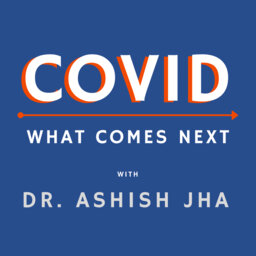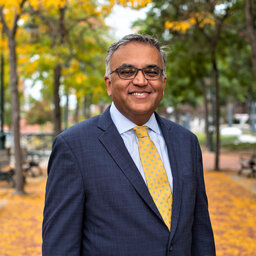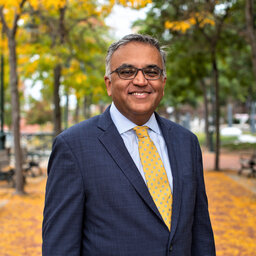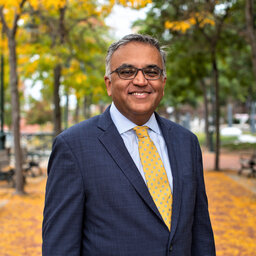Welcome to Episode 30 of “COVID: What comes next,” an exclusive weekly Providence Journal/USA TODAY NETWORK podcast featuring Dr. Ashish Jha, dean of the Brown University School of Public Health and an internationally respected expert on pandemic response and preparedness.
PROVIDENCE – “A breakthrough” was Dr. Ashish Jha’s assessment Tuesday of the CDC guidance that fully vaccinated people need not wear masks in most situations.
“You basically can return to life as it was in 2019 and that’s pretty profound,” said the dean of Brown University’s School of Public Health.
But Jha acknowledged questions surrounding the ruling as states, municipalities, and businesses adopt policies while the COVID-19 pandemic continues to ease in much of the U.S. And he spent several minutes discussing the broad and fine points of mask-free living in an effort to cut through what he described as “confusion and complexities.”
“If you're fully vaccinated, you're good to go,” Jha said. “You don't need to be wearing a mask outdoors. You don't need to be wearing a mask indoors. You don't need to do to be socially distanced from vaccinated people. You don't need to be socially distant from unvaccinated people. If you're fully vaccinated, it doesn't matter what's happening around you, with a few exceptions.”
Jha listed three.
“A super-crowded stadium, a packed indoor concert, potentially a packed outdoor concert, someplace where you're essentially going to be breathing somebody's else's respirations for hours,” he said. “That's probably where maybe we should do something different,” such as wearing masks and practice distancing, or not attending at all.
Other exceptions where the CDC said masks and distancing are still required include health-care settings, facilities that serve people experiencing homelessness, and public transportation: buses, trains, airplanes and the airports and stations that serve them.
Jha acknowledged that in most settings currently an honor system, not actual proof of full vaccination, is the method of verification. Given the example of a health club or gym that might ask patrons if they are fully vaccinated, the scientist and physician said while recording the 30th episode of the “COVID: What Comes Next” podcast:
“If you're fully vaccinated, the CDC is saying, ‘why do you care?’ If someone is deceptive and lies and says they're vaccinated when they're not and they go in -- if you're fully vaccinated, it doesn't make any difference to you… You're not going to get infected or if you do, you're not going to get sick.”
The discussion turned to the eventual likelihood that reliable means will be developed allowing an individual to demonstrate full vaccination status beyond presentation of a paper card – vaccine passports, as they have been called.
“I don't think the government's going to be issuing vaccine passports, but let me assure you there are a whole bunch of private companies that are working on developing these things because businesses want them, gyms want them, restaurants want them,” Jha said.
“You can imagine that some restaurants know that some patrons are going to feel a lot more comfortable doing indoor dining if they know everyone is vaccinated. So as a restaurant, you could say ‘we have a vaccinated-only policy.’ And if you can verify who is vaccinated, that restaurant becomes exceedingly safe for everyone.”
And that would be a big selling point, Jha said.
“The basic point is that these vaccine passports are coming, but they’re going to be private-sector solutions,” he said.
During the recording, Jha also explored the possibility that come cold and flu season, people may choose to wear masks in certain situations to avoid becoming sick. Reflecting the experience of other countries where mask-wearing has been mandated until now, the just-ended annual flu season in America was comparatively mild.
“If everybody wears masks or some chunk of people wear masks, it’ll reduce the amount of flu,” said Jha. “And if we continue hand-washing and surface-cleaning, we will definitely make an impact on the flu as well. So I expect to have a milder flu season. Knock on wood, I haven't gotten a cold in a year.”
For the first time since the podcast, available exclusively from The Providence Journal and the USA TODAY NETWORK, debuted in October, the recording took place not by Zoom but in-person at Jha’s Providence office. Both Jha and Miller are fully vaccinated.
Jha also answered an audience question from a professor at a New England college who asked:
“Due to the potential lower efficacy of J&J in comparison to other vaccines, could (or should) one who is vaccinated with J&J consider doubling up with either the Pfizer or Moderna vaccine, especially if the current demand is lower than supply? Would there be a downside to doing that?”
Jha answered that he is impressed with the Johnson & Johnson one-shot vaccine and added: The CDC and a bunch of immunologists are working on guidelines on this. So, what I would say to this person is: ‘As a whole, infection numbers are down, They’re very, very well protected with a really terrific vaccine that will protect them from severe illness and death.’
“ ‘Let's see what the next few months bring in terms of science and data on mixing and matching of vaccines.’ ”
To hear Dr. Jha’s full answers to these questions and learn more details about other issues discussed in this 30th episode, please download the podcast. This weekly podcast is hosted by G. Wayne Miller, health reporter for The Providence Journal.
 COVID: What comes next - With Dr. Ashish Jha
COVID: What comes next - With Dr. Ashish Jha


